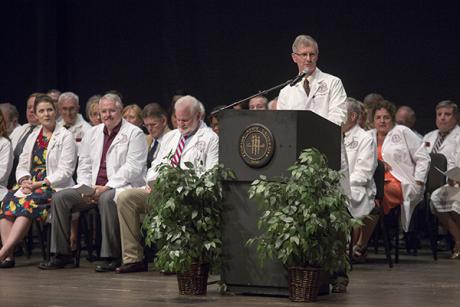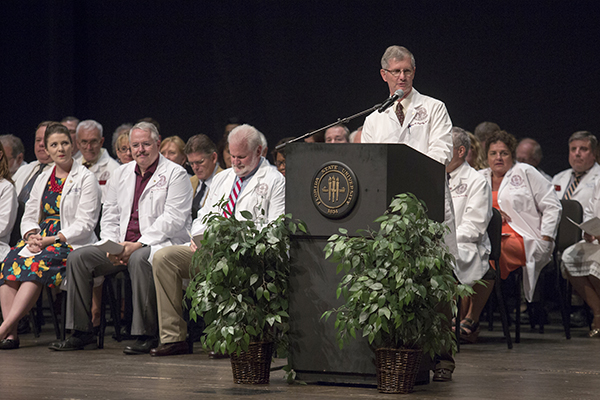White Coat pledge: ‘To dedicate my life to the service of humanity’


Aug. 12, 2016
In four years, the College of Medicine’s Class of 2020 will cross the stage in Ruby Diamond Concert Hall to receive their M.D. degree. Friday evening, though, after just 10 weeks in medical school, they crossed the stage to receive a spotless symbol of their chosen profession: a white coat.
They haven’t earned it yet. That’s not the point of the annual White Coat Ceremony. The point is to remind them – before an audience of loved ones and friends – that they’re taking on a huge responsibility. Toward the end of the event, they even repeated an oath that stated, in part: “I pledge to dedicate my life to the service of humanity.”
The other goal of the White Coat Ceremony is to give these hard-working new med students some encouragement after they’ve spent all summer in the anatomy lab and the classroom.
“You weren’t sure that you were up to the challenge or had what it took to succeed here,” Dean John P. Fogarty told them, reminding them how apprehensive they’d been 10 weeks earlier. “Well, now that you’re at the end of summer, things look a lot different, don’t they? Yes – it was hard, but you’ve discovered that you really DO belong in medical school.”
Fogarty painted a picture of this diverse group of students.
“For your parents and loved ones,” he said, “here is some data about your class:
- “Your class is majority female, with 68 women and 53 men.
- “You range in age from 20 to 37.
- “Over half of you (70) did your undergraduate work at FSU.
- “In keeping with our mission and geographic focus, 33 of you come from Florida Panhandle counties, and a good many of you come from areas designated as rural.
- “You have wonderful diversity, with 11 students who are Hispanic, 17 African-American and 19 Asian/Pacific Island.”
That diversity is no accident. The college has multiple pipeline programs to ensure its student population resembles the Florida population, because a key piece of its mission is to produce the kinds of physicians that the state’s diverse communities need most. In fact, FSU’s medical school has become the most diverse in the country, according to data from the Association of American Medical Colleges. It’s the only one ranked in the top six for both black and Hispanic students.
For the Ruby Diamond audience, the high point of the evening arrived when the students, four at a time, took to the stage so faculty members could help them into their new coats. A dozen students were coated by relatives who are either faculty members or alumni of the med school.
“The white coat, along with the stethoscope, is one of the most recognizable symbols of medicine,” Fogarty reminded them. “While you should wear it with great pride, you must recognize that with this symbol comes great responsibility. You are not just going to school – you are joining a profession.”
Continuing a recent tradition, the main speaker was a College of Medicine alum. Rachel Bixler (Class of 2011) returned to Florida two years ago from residency training at Wake Forest Baptist Medical Center and is practicing family medicine in the Panhandle town of Port St. Joe – where she grew up.
At one point in her speech, she described life-changing moments in medicine:
“… It’s the moment when you are the only one in the room who knows the results. You have to tell them the biopsy was positive. The procedure didn’t work. The CT shows a mass. Sometimes it’s not terminal. Something straightforward to us, like a diagnosis of diabetes, but that was the diagnosis they fought years to avoid. And that’s when our patient’s world stands still.
“The opposite is also true. When we are the ones holding the good news. When you are the only one who knows that the mammogram is clean or that the biopsy is negative. In those conversations, speak carefully and with kindness. Know that your patient’s world can stand still even with good news.”
Among other special moments at the White Coat Ceremony:
- Two Distinguished Alumni Awards were given out. One went to Garrett Chumney (Class of 2005), who grew up in Apalachicola and now cares for patients in both the Tallahassee and Blountstown areas. He’s a hospitalist at the Tallahassee Memorial Hospital Behavioral Health Care Clinic, and he also directs the emergency room at Calhoun Liberty Hospital. The other award went to Michael Weiss, assistant professor of neonatology at UF Health at the University of Florida. He did his first year of medical school at Florida State through the Program in Medical Sciences, forerunner of the College of Medicine.
- Seventeen fourth-year students were inducted into the FSU Chapman Chapter of the Gold Humanism Honor Society. “Each received multiple nominations from faculty, staff and classmates in categories that assessed: care with caring, service, and clinical excellence,” explained Daniel Van Durme, faculty co-advisor for the Chapman Chapter. They were recognized, he said, as the ones you’d want to care for your own loved ones.
“As I see the promise and enthusiasm in the faces before me,” Gold Humanism inductee Angelina Malamo told the first-year students, “I am filled with hope that we will not only meet but exceed the standards of both technical excellence and humanism for which this program is known.”
View the complete White Coat Ceremony video
RACHEL BIXLER’S ADDRESS
How many of you remember the day you were accepted into medical school? It’s the phone call that forever changes your life, if you accept. My husband remembers that day well. He was working as a personal trainer at Premier Gym. He was so overwhelmed with excitement, he had to lie down on the floor in the middle of the gym. I remember my phone call. I was in the middle of Panama City Mall with my mother. I’m pretty sure I told 4-5 perfect strangers I had been accepted to medical school.
It’s amazing how a moment that short, probably no more than 60 seconds, can change your life. 60 seconds. The span of time we base breathing rate, pulse. And depending on what you fill those seconds with will determine just how fast or slow it will feel.
There is another moment in medicine that is life-changing, but not to us. It happens so frequently we often forget how unique this moment is for our patients. It’s the moment when you are the only one in the room who knows the results. You have to tell them the biopsy was positive. The procedure didn’t work. The CT shows a mass. Sometimes it’s not terminal. Something straightforward to us, like a diagnosis of diabetes, but that was the diagnosis they fought years to avoid. And that’s when our patient’s world stands still. The opposite is also true. When we are the ones holding the good news. When you are the only one who knows that the mammogram is clean or that the biopsy is negative. In those conversations, speak carefully and with kindness. Know that your patient’s world can stand still even with good news.
There are so many moments in medicine that scare our patients, but what about the times that terrify us? Often, it happens when we are still learning how to do something for the first time. This is where listening and learning now while you have someone to guide you is all the more important.
Delivering a baby for the first time. Your first sutures. Your first day of residency. That first order you sign your name with an M.D. I remember one of my first written orders as a doctor. I have never stressed over an order for Tylenol so much in my life. Getting called to your first code blue. Sometimes, you just have to do it scared. Listen to your professors and attendings. Practice in the Sim Lab and CLC. Soon you will be prepared even for the unexpected.
During my second year of residency, my most unexpected moment occurred. I was working my first day on my geriatric rotation in the nursing home. I was working with one of our renowned faculty members within family medicine and geriatrics. We were finishing our notes from the morning, when I noticed he was taking extra long to complete the plan. We were seated side by side so I could see what he was writing. Instead of words there were large circles on the paper chart. That’s when I felt time stand still. I said his name and grabbed his shoulder. At that same moment, he collapsed directly on me.
I sat him up immediately and swiveled his chair to face me. That’s when I saw his facial droop, blank stare and completely limp arm. For a split second, I hoped he was just acting up, as he was known to do. I remember calling out for help and calling 911. Then suddenly, almost like when a record or CD skips and the melody restarts, the world sped back up. My training kicked in, and I knew what I needed to do. You are all going to have moments that terrify the stew out of you. But that’s where you remember, you will have studied hard and will be well trained. Trust that.
Don’t forget that there are moments outside of medicine that can be just as important. Call your best friend on their birthday. Cook dinner with your spouse. Share coffee with your mom or dad. Read the bedtime story with your child. Hobbies! They keep you sane. Work out. Exercise. Eat right! It’s amazing how we can preach this to our patients, yet not listen to our own advice. I had a patient once trying to take care of everyone else in her family and her own health was crumbling. She was a flight attendant. She said, “I get it. I have to put my own oxygen mask on first, before I help someone else. I of all people should get that.” We, as physicians, should “get that” too.
Then there are times that make you feel like you could soar. When the baby you just delivered finally takes his first breath. When your rehab patient finally goes home. When you get to rejoice with a lung cancer patient on their last day of chemo. When my attending who had the stroke WALKED into his retirement party and gave a speech. Med school graduation. Your last medical school exam. Your first stethoscope. Or like tonight, when you receive your white coat.
I know you wonder how you will ever be ready for all that medicine has in store. If you pay attention and really listen to what your mentors have to teach, I assure you, you will be well trained for the next step in this wonderful journey. Remember there is joy in that journey. Just remember that the real medicine happens in between using your SOFTEN skills, sorting through the physical exam checklists in your head, and remembering what part of the brachial plexus could possibly be involved. Medicine happens where all that you were taught comes together with your love of your field and your compassion for the human being sitting in front of you.
Tonight, I will leave you with one of my favorite poems by Apollinaire.
“Come to the edge," he said.
"We can't, we're afraid!" they responded.
"Come to the edge," he said.
"We can't, we will fall!" they responded.
"Come to the edge," he said.
And so they came.
And he pushed them.
And they flew. (Guillaume Apollinaire)
Class of 2020, time to grab your coats. You’ve got some flying to do.

